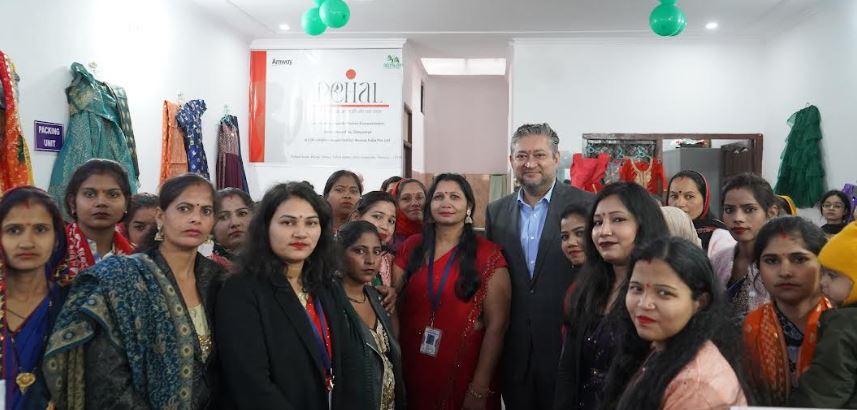New Delhi, 15 th Feb 2024 – In a steadfast commitment to community development, Amway India, one of the leading FMCG Direct Selling companies, championed the cause of women empowerment amongst less privileged with the introduction of ‘Pehal’ under its Nari Shakti Project in collaboration with its NGO partner, Deepalaya. Unleashing the potential of a collective endeavor, Pehal stands as a unique platform empowering less privileged women to initiate and establish sustainable enterprises for economic sustainability. Functioning as both a production center and a retail outlet, Pehal will be run by 40 women beneficiaries of Project Nari Shakti, a skill development and livelihood program dedicated to empowering women.

The initiative was inaugurated by Shri. Lachhiram Naib Tehsildar, Mr. Rajneesh Chopra, Head, Amway India, Mr. Ajay Khanna, CMO, Amway India, and Dr. George John, Secretary & Chief Executive, Deepalaya, besides other officials from Amway India and Deepalaya.
Speaking on the occasion, Mr. Rajneesh Chopra, Head , Amway India said, “In today’s dynamic world, women stand as powerful agents of change, defending essential values and driving progress. Reflecting this momentum, the Ministry of Statistics and Program Implementation report indicated women constitute 1 13.76% of entrepreneurs in India, revealing vast opportunities for economic independence. At Amway, we believe that women play a pivotal role not only in driving economic growth but also in shaping the broader fabric of our society. With this unwavering commitment, we introduced Nari Shakti – a women’s livelihood program in India to empower less privileged women to achieve economic sustainability. It gives us a sense of fulfillment that the initiative has transformed the lives of over 35,000 individuals, including 3000+ women since its inception. Remarkably, 80% of these women have attained self-sufficiency in their livelihoods. We firmly believe that the introduction of the Pehal initiative will catalyze our efforts by actively fostering the growth of a vibrant entrepreneurial ecosystem led by women at the grassroots level. It stands as a testament to our commitment to diversity and inclusivity, aligning seamlessly with our broader vision of women’s empowerment. Our heartfelt wishes to all the women of Pehal as they embark on their journey towards self-reliance and economic sustainability. Together, we pave the way for a brighter, more inclusive future.”
Pehal is a special project focusing on women’s livelihood that serves as both a production center and retail outlet, run by 40 women who are direct beneficiaries of Project Nari Shakti- a women’s skill development and livelihood program by Amway India. This initiative aims to offer a diverse array of high-quality handmade products, including apparel, home décor items, kitchen essentials, fashion accessories, and more. Additionally, Pehal is committed to providing practical skills development training to 200+ new students, fostering growth and empowerment among women. Amway India is dedicated to providing essential funding for the establishment and administration of the center to its implementing partner, Deepalaya, for an initial three-year period. Deepalaya will play a pivotal role in imparting marketing and sales training, empowering women to establish and sustain their enterprises successfully.
Speaking on the collaboration, Dr. George John, Secretary & Chief Executive, Deepalaya stated, “We are delighted to strengthen our partnership with Amway India with this ‘Pehal’ initiative under Project Nari Shakti. Deepalaya is committed to the upliftment of women, and, through this collaboration, we aim to fortify Self-Help Groups and empower local artisans. By promoting women’s entrepreneurship and providing comprehensive training, ‘Pehal’ is a significant step towards economic sustainability and socio-cultural enhancement. Together with Amway India, we look forward to making a lasting positive impact on the lives of women in Sohna, Haryana, and contributing to a more inclusive future.”

